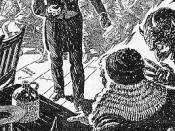Human Intent and the Aftermath of It
Washington Irving, in writing 'The Devil and Tom Walker', and Stephen Vincent
Benet, in writing 'The Devil and Daniel Webster' illustrate to the reader the
consequences of man's desire for material wealth and how a person's motivation for a
relationship with the devil affects the outcome of the 'deal'. In these two different, yet
surprisingly similar narratives, the authors present their beliefs about human intent and
motive.
In 'The Devil and Tom Walker', the story is seen of a stingy man and his nagging
wife who '...were so miserly that they even conspired to cheat each other' (128). In the
story, one sees a man make a deal with the devil, who in the story is known as 'Old
Scratch', for the sole purpose of personal gain. Tom Walker, seeing only the possible
wealth that he could achieve, bargains with the devil and finally reaches an agreement
which he sees to be fair.
Tom does not see the danger present in bargaining with such
a powerful force for so little gain. There is a note of humor present in the narrative,
which adds to the sense of danger that is present making deals that one does not
intend to keep. Commenting on the story, Larry L. Stevens notes that 'This tale,...,
comically presents the results of valuing the dollar above all else.' This story does a
very good job of conveying a message to the reader about human values.
In the story Tom is seen as a very self-centered man who cares only for himself and
his own well being. He is not even phased when he discovers the remains of his wife
hanging in a apron in a tree; 'Tom consoled himself for the loss of his...


